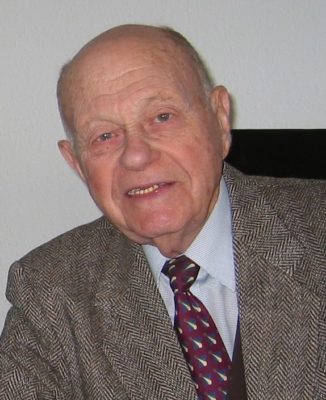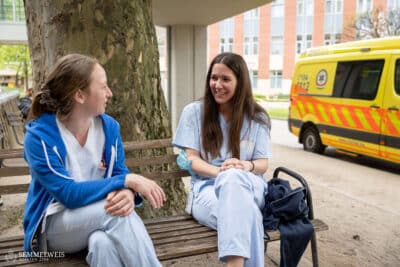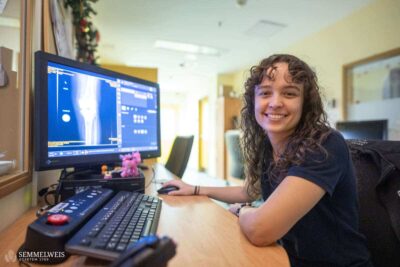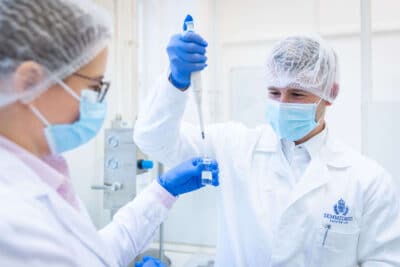Dr. György Bender, Professor Emeritus, who graduated as a general practitioner from the legal predecessor of Semmelweis University in 1951, and then worked for forty years at the Department of Orthopedics of the university, is 100 years old today. On the occasion of his birthday, we would like to greet him with the praise compiled by the department.
 Dr. György Bender was born in March 1921 in Jászberény. In a conversation with him, he shared many details about his life but was modestly silent about his youth. He acquired the baccalauerate, but before and during the war he could not think of university studies. As his father worked in the iron profession, he was able to use his dexterity to learn the profession of tool locksmith. He experienced the war as a laborer, and in 1945, at the age of 24, he enrolled in the medical faculty of the university.
Dr. György Bender was born in March 1921 in Jászberény. In a conversation with him, he shared many details about his life but was modestly silent about his youth. He acquired the baccalauerate, but before and during the war he could not think of university studies. As his father worked in the iron profession, he was able to use his dexterity to learn the profession of tool locksmith. He experienced the war as a laborer, and in 1945, at the age of 24, he enrolled in the medical faculty of the university.
During his medical years, he visited the surgery department of Szabolcs Street Hospital, where he got acquainted with surgery alongside one of the renowned surgeons of the age, Dr. Béla Molnár. In his final years at university, his mentor recommended that he should take a job in the then-awakening field of orthopedics. After graduating, in 1951 he was admitted to the already established Department of Orthopedics. He played an important role in starting the work at the department. This is were he became acquainted with the then growing orthopedic surgery. The surgical knowledge of the medical years was of great help for him in this.
Surgical care for victims of recurrent childhood paralysis epidemics fell in the early days. He gained great practice in mastering the conservative orthopedic methods of the time.
His need to increase his surgical knowledge led him to take part in the work organized in 1956-57 to overcome the difficulties caused by the Korean War. Here he had to operate in all sorts of areas. After returning, he became a senior member of the department. Under the leadership of Professor Andor Glauber, his professional activities were completed. Starting from 1957, he became head of one of the sections of the department. In the management of the department, his responsibilities were connected to the organization of daily work.
Dr. György Bender joined the then established Department of Orthopedics in 1951, where he worked as a teaching assistant, then assistant professor, from 1972 as an associate professor and from 1977 as a university professor. He retired in 1991, but still spent a lot of time at the department for many years after retirement. Since then, he has been Professor Emeritus of the department. In 1956-57, he was head of the Traumatology and Orthopedic Department of the Korean Hungarian Hospital. In 1971 he defended his candidate dissertation. For three decades, he was a consultant to the Hungarian shoe industry and participated in the development of healthy children’s shoes. Much of his scientific work has been limited to the treatment of foot and spine diseases. He has been involved in the design of orthopedic aids and orthopedic shoes for decades. He has given lectures on this topic at several congresses in Hungary and abroad. In addition to having a membership in several Hungarian scientific societies, he was a member of the International Society of Orthopedics and Traumatology (SICOT). He wrote eight books, three excerpts, and sixty papers.
In the field of scientific work, he chose an area that was becoming increasingly important at that time, the treatment of foot diseases. In addition to orthopedic shoe care, he aimed to prevent foot diseases. In the sixties, he developed close cooperation with the leather and footwear industry. Initially, he became a recognized expert only in Hungary and later in Eastern Europe. In the meantime, he has written several articles and monographs on topics related to his scientific fields, and in 1970 he was awarded a candidate’s degree as a summary of his scientific achievements. Based on his further scientific and teaching activities, he was appointed associate professor, and in 1977 he was appointed university professor.
In 1980, when Professor Glauber retired, he headed the department for six months as acting director, without any break in its operation.
The adult orthopedic ward located on the 2nd floor operated alongside the facilities of the time. It was here that modern spine surgery was developed by Dr. Péter Pál Varga, who later left the department and established the National Center for Spinal Disorders, which still operates today. In this work, Professor Bender played a major role in the beginning.
In addition to scientific work, several young colleagues also received initial training at his department. With his patient, purposeful work, he provided a good foundation for further careers.
His family life began with his marriage in 1949. His son, Tamás was born in 1951, who, as an adult, also chose to pursue a medical career and, to the great pride of his father, reached the top of his profession as a university professor. Dr. Tamás Bender, a rheumatologist, is the chief physician of the Budai Irgalmasrendi Hospital, as well as a professor at the University of Szeged and a doctor of the Hungarian Academy of Sciences. Professor Bender’s marriage could last for an unprecedented length of time, 71 years, until the unexpected death of his wife.
He retired 30 years ago in 1991, but for a long time he helped his successor to further develop the field of foot surgery and podology. As long as his physical strength allowed him to maintain a close relationship with the department, his retirement was only a symbolic change in the relationship between the department and Professor Bender.
His work has been recognized with several state and university honors, including the Order of Merit.
During his long life, he had several opportunities to praise his life and individuality. We wish him all the best.
Dr. Ferenc Mády, (retired) Associate Professor, Semmelweis University, Department of Orthopedics
Translation: Katalin Illés-Romhányi


